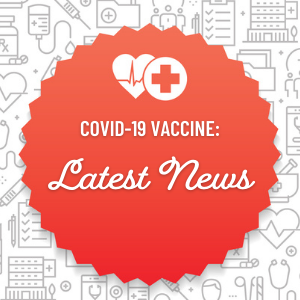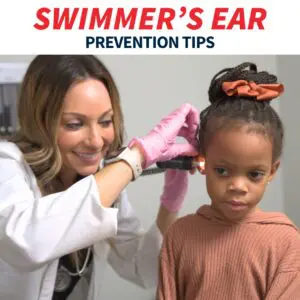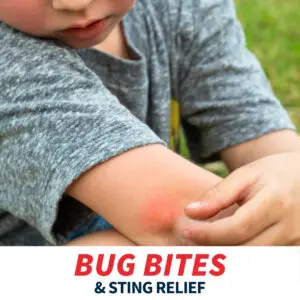Latest News on the COVID-19 Vaccine
 As the COVID-19 pandemic continues into the holiday season, many are looking for the light at the end of the tunnel in the form of a vaccine. There’s been quite a bit of talk in the news about vaccine options projected to be distributed within a matter of weeks, but what does that entail?
As the COVID-19 pandemic continues into the holiday season, many are looking for the light at the end of the tunnel in the form of a vaccine. There’s been quite a bit of talk in the news about vaccine options projected to be distributed within a matter of weeks, but what does that entail?
We are committed to keeping our patients up-to-date on the latest COVID-19 information. We are not currently offering the COVID-19 vaccine but will provide updates as more information becomes available. Here’s the latest news about the COVID-19 vaccines, and what we know as of December 1, 2020.
Vaccine Development & Safety
According to the Centers for Disease Control and Prevention (CDC), there are multiple vaccines being developed, and as of November 24, 2020, there are five COVID-19 vaccines in the U.S. that are currently undergoing clinical trials or in the planning phase. Although the development of these vaccines has occurred rather quickly, people have pointed out that it has taken longer to develop than vaccines for a different strain of influenza, such as H1N1. Unlike the flu, there is not a vaccine already developed for other coronaviruses, so scientists are essentially creating a vaccine from scratch, followed by testing to ensure effectiveness and safety.
While it has been a priority to get a COVID-19 vaccine to people as quickly as possible, making sure they are safe is essential. During clinical trials, scientific data is evaluated based on the thousands of study participants who received an investigational COVID-19 vaccine. The Food and Drug Administration (FDA) created a specific guidance document to ensure the trials are performed according to the strict safety standards they developed. Once the trial findings have been reviewed by the FDA and deemed safe and effective, they can be approved and expedited through the emergency use authorization. The Advisory Committee on Immunization Practices (ACIP) will then review the data to make recommendations to the CDC regarding who should receive the vaccine. After approved for use, the vaccine will be monitored closely for any side effects or events that may not have occurred during clinical trials to determine if any recommendations will need to be updated.
Projected COVID-19 Vaccine Recommendations
Based on current input the CDC has from the ACIP, some recommendations are being made in the event vaccine supplies are limited once available. In determining who should be receiving the vaccines first, the ACIP’s goals for recommendations include:
- Decreasing deaths and instances of serious disease as much as possible
- Preserving the functioning of society
- Reducing the extra burden the disease is having on people already facing disparities
- Increasing the chance for everyone to enjoy overall health and well-being
Based on these goals, it has been determined that, if there is limited initial supply of a COVID-19 vaccine, there are four groups that will most likely receive recommendation for early vaccination. These four groups are:
- Healthcare workers
- Workers in essential and critical industries, such as those involved in America’s critical infrastructure
- People found to be at high risk for severe COVID-19 illness due to underlying health conditions
- Individuals 65 years of age and older
Even if supplies are limited early on, they will increase over time, allowing all adults to be vaccinated later in 2021. For young children, more studies are required before a COVID vaccine will be made available.
What to Know About the Vaccines
Most of the COVID-19 vaccines will require two shots in order to be effective (one vaccine is being developed that will only require a single dose). In terms of vaccine costs, the doses that have been purchased with U.S. taxpayer dollars will be provided to Americans at no cost. This does not, however, include possible administration fees that would be charged by providers, which may be reimbursed through public or private insurance, or the Health Resources and Services Administration’s Provider Relief Fund. It is not yet clear how long immunity will last after receiving the vaccine as long-term studies will need to be performed. The same goes for those who have been infected with COVID-19 and recovered – although there is some level of natural immunity, it’s unclear how long this lasts, but there is some evidence suggesting this type of immunity for some individuals does not last long.
Protecting Yourself from COVID-19 before a Vaccine is Available
While it seems there may be relief via vaccine coming soon, it is still extremely important to take the appropriate steps to protect yourself and others from contracting or spreading COVID-19. Continue to wear a mask over your mouth and nose, and stay at least six feet away from others. Wash your hands thoroughly and often with soap and water for at least 20 seconds. Always cover your mouth and nose with a tissue or inside of your elbow when you cough or sneeze. Clean and disinfect frequently used surfaces each day, and monitor your symptoms regularly to watch for any possible signs of infection.
If you believe you may have been infected with COVID-19, or need help keeping you and your family healthy, contact one of our convenient Midwest Express Clinic locations today. We offer COVID-19 testing and antibody testing, as well as a variety of primary and preventative care services in a safe and clean facility.




